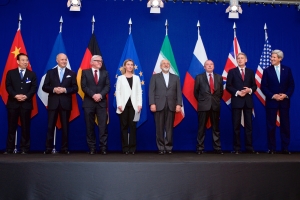
When Congress Toys with Foreign Policy
Reprinted from the CPD Blog by Sohaela Amiri (Mar 11, 2015)
On March 3, 2015, the entire world watched the United States Congress giving the Prime Minister of Israel, Benjamin Netanyahu, a fervent round of applause with 26 standing ovations after a speech that was not welcomed by or coordinated with the White House. While almost all major world powers criticize Netanyahu’s position against nuclear negotiations with Iran, the U.S. Congress embraced it with open arms. What message does this send to the rest of the world? Many different messages, perhaps, none of which are helping the United States to improve its image abroad: a country divided in two; a dysfunctional system; 477 members of Congress rooting for a foreign leader (whose global popularity is questionable), opposed to their own President on a foreign policy issue that is not exactly their area of expertise.
In 2014, the U.S. spent at least 1.3 billion dollars to advance its foreign policy objectives through public diplomacy efforts (including international broadcasting). I wonder how much damage has been done to these efforts as a result of U.S. Congress attempts to interject itself into delicate diplomatic negotiations. The U.S. lawmakers’ over-exaggerated endorsement of the Netanyahu speech was followed by an op-ed letter sent on March 9 to “Iran’s leaders” by 47 U.S. Senators. Both of these actions are testimonies to misconduct by U.S. officials. In a hyper-connected world, events such as this can have consequences for a country’s reputation and credibility. The actions and words of politicians around the world can and do have public diplomacy implications, even if the person is not a diplomat.
The Senators' letter, intentionally or not, challenged their own government, and demonstrated a complete lack of knowledge about the U.S. Constitution and international law, as well as a lack of respect towards their own nation. This became even more embarrassing when they were lectured by the Iranian Foreign Minister on how their own government works, reminding them that they have neither the expertise nor the legal authority to enter the foreign policy domain. Javad Zarif, in his response to the authors of the letter, described the letter as “unconventional and unprecedented in diplomatic history.” He added that “the world is not the United States, and the conduct of inter-state relations is governed by international law, and not by U.S. domestic law.”
But even if one is not an expert in international relations, a fair understanding of the world outside the U.S. can put things into perspective and inform one’s decision-making. Last week, U.S. Congress sent a message to the world: that American officials are very similar to, very close to, and very supportive of Benjamin Netanyahu, a foreign leader who’s facing sharp worldwide criticism, even from major Israeli authorities and many Jewish people. Yet members of Congress don’t seem to be aware of these facts or care about the grim consequences of their actions for their country’s image and credibility across the world.
As Vice President Joe Biden points out, America’s global influence “depends on its ability to honor its commitments.” These commitments “are essential tools to the conduct of our foreign policy, and they ensure the continuity that enables the United States to maintain our credibility and global leadership even as Presidents and Congresses come and go.” The message of the letter from GOP Senators is both “false and dangerous” as it “signals to friend and foe alike that that our Commander-in-Chief cannot deliver on America’s commitments.”
Whether the intention behind such actions by members of Congress was to undermine the Obama Administration, to sabotage the nuclear negotiations, or to gain domestic support, they have done nothing but sabotage the image of the United States; this puts them on the wrong side of history and susceptible to extreme ridicule by the rest of the world, as well as condemned by many Americans who feel insulted. One wonders if the GOP Senators are playing a game of good cop/bad cop, or are they jeopardizing United States’ credibility?
Issue Contents
- Introduction
- A Tale of Two Speeches: American Identity and Diplomacy
- Economic Sanctions as Temper Tantrums
- The U.S.’ Image Among Shia Muslims
- Lessons From the Past: U.S.-Iran Public Diplomacy
- When Congress Toys with Foreign Policy
- Israel, Public Diplomacy, and the Iran Agreement
- The #IranDeal: What Obama and Rouhani Have in Common
- America and Iran: Following Up with Public Diplomacy
- PD News Stories Related to the #IranDeal
Most Read CPD Blogs
-
May 17
-
May 29
-
June 3
-
May 15
-
May 20
Visit CPD's Online Library
Explore CPD's vast online database featuring the latest books, articles, speeches and information on international organizations dedicated to public diplomacy.









Add comment